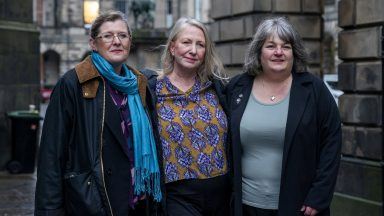Loan sharks have been using food bank social media pages to target vulnerable Scots ahead of Christmas, research has found.
Trading Standards Scotland said the Scottish Illegal Money Lending Unit (SIMLU) found that up to 300,000 people are at risk of falling victim to loan sharks.
It warned that illegal lenders are increasingly using social media platforms, such as Facebook, Instagram and Snapchat, to advertise high-interest loans and target potential victims.
SIMLU said that in some cases, loan sharks have been found to target the social media pages of local food banks to take advantage of people when they are at their most desperate.
The watchdog shared that it was previously contacted by a single mother from Glasgow who borrowed £250 from a loan shark last year to pay for a new bed for her toddler son.
She told the organisation that the lender began charging her £25 interest every fortnight.
The mum said she was initially able to make the payments but missed one after Christmas so she could afford to heat her home. After that, she was told the payment would double the week after.
SIMLU said that the loan shark came to her home and threatened to harm her son and assault her after she failed to attend their next meeting to pay him.
She reported the loan shark’s actions, and officers from SIMLU were able to help the woman access a local food bank and receive debt and welfare advice.
The watchdog, which is part of Trading Standards Scotland, urged people to be aware of the risks posed by illegal moneylenders in the run-up to Christmas.
A survey of 1,113 Scottish adults commissioned by SIMLU found that 7% of them had encountered a loan shark online or in their local community.
The study said that this equates to 300,000 people across the wider population, most of whom had seen loan sharks advertise online via social media or on WhatsApp.
SIMLU said that although loans can be a quick solution for those in crisis, they can cost three times as much as legal loans.
It urged anyone who has fallen victim to not “feel guilty or ashamed” and to seek help by reporting their experiences through it’s online form or calling 0800 074 0878 for advice.
The organisation is also advising people to look out for family, friends and neighbours who might have fallen victim to a loan shark, and to contact SIMLU on their behalf if they are worried.
As part of its work to prevent people falling victim to illegal money lending, Trading Standards Scotland has launched three financial literacy projects in different parts of the country.
One is being run by the charity Scottish Women’s Aid, with the aim of increasing and protecting women’s financial independence and researching the issue of “coerced debt” among domestic abuse survivors.
Another project will be led by the Lothian Centre for Inclusive Living in Edinburgh, providing financial workshops for disabled people and those living with long-term health conditions.
The third project, called Saved by the Bell, is a financial education programme that aims to reduce poverty by advancing financial literacy among school pupils in Dundee.
Fiona Richardson, chief officer of Trading Standards Scotland, said the dangers of borrowing from illegal lenders cannot be “overstated”.
“It is truly shocking that loan sharks are seeking to take advantage of the cost of living crisis by targeting people who are struggling to pay their heating bills and put food on the table,” she said.
“The Scottish Illegal Money Lending Unit has handled some terrible cases where people have been enticed into borrowing money only to find themselves threatened with violence when they cannot meet sky-high interest repayments.”
She added that although people may feel pressure in the build-up to Christmas, they should never borrow from a loan shark.
“Our advice is to never borrow from a loan shark, but if you have done or even if you are thinking about doing so, please come to us so our experts can help you,” she continued.
“SIMLU has been investigating and bringing illegal lenders to justice for 20 years, and the more people who report such crimes the less chance there is of others falling victim.”
Scottish secretary Ian Murray welcomed the work from Trading Standard Scotland, saying the tactics used by illegal money lenders are “alarming”.
“I’d urge anyone who has fallen victim to the criminals peddling these illegal inflated loans to contact SIMLU so that they can get help and advice and also so these loan sharks can be stopped,” he said.
He added that action to reduce poverty is “central” to the UK Government’s mission to drive economic growth.
“We’re making work pay, ensuring the national minimum wage is a true living wage and ending exploitative zero-hours contracts so workers have increased job security,” he said.
“We need to put a stop to criminals who prey on people who are struggling financially when they are at their most vulnerable.”
Follow STV News on WhatsApp
Scan the QR code on your mobile device for all the latest news from around the country


 iStock
iStock

























